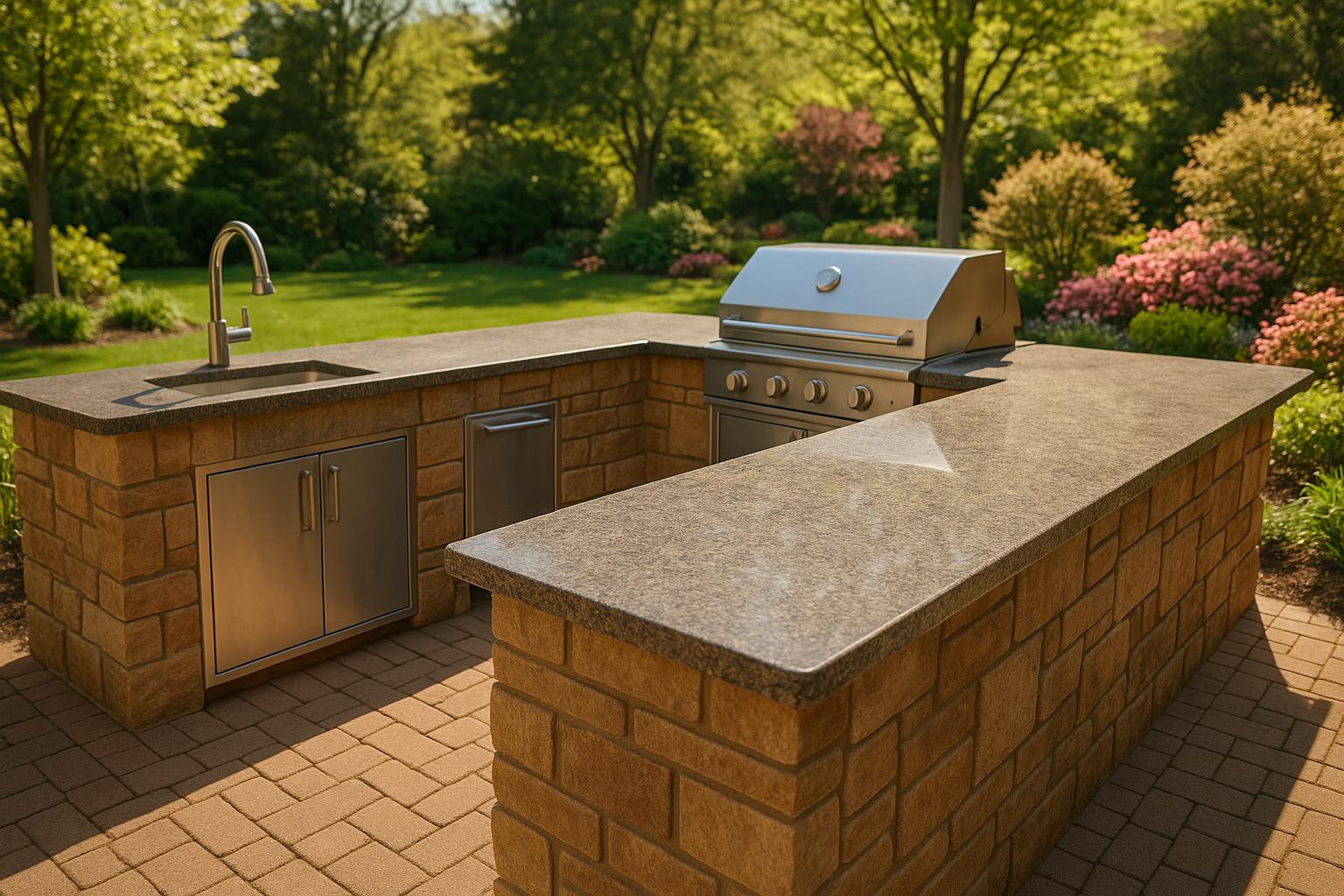- bhavya gada
- No Comments
Maryland’s weather is tough on outdoor countertops. Summers bring heat and humidity, while winters introduce freezing temperatures, snow, and freeze-thaw cycles. Choosing the right material is key to avoiding cracks, warping, and costly repairs. Here’s a quick guide to the best options:
- Granite: Durable and heat-resistant but requires sealing.
- Quartzite: Handles temperature swings well; needs sealing.
- Concrete: Customizable and strong; proper curing is critical.
- Soapstone: Non-porous and low-maintenance; resists moisture.
- Porcelain: Ultra-durable, low-maintenance, and fade-resistant.
- Recycled Glass: Eco-friendly, sturdy, and UV-resistant.
- Tile: Affordable and repairable; grout upkeep is necessary.
- Limestone: Stylish but high-maintenance; prone to weathering.
- Travertine: Heat-resistant but requires sealing for longevity.
Each material has pros and cons, but durability, weather resistance, and maintenance are key factors to consider. For expert installation tailored to Maryland’s climate, consult professionals like Pro Landscapes MD.
Choosing Outdoor Kitchen Countertops | The Practical Guide to Material Options
1. Granite
Granite stands out for its natural strength and timeless appeal, making it a solid choice for Maryland’s unpredictable weather – provided it’s sealed correctly. A good seal boosts granite’s ability to withstand heat, moisture, and the freeze-thaw cycles that can be tough on outdoor materials. Up next, we’ll take a closer look at quartzite, another durable option worth considering.
2. Quartzite
Quartzite is a stunning and durable choice for outdoor kitchens in Maryland. This metamorphic rock stands up well to heat, scratches, and stains, though it’s slightly less tough than granite.
Durability
Quartzite’s transformation during its formation gives it impressive hardness and scratch resistance, making it a strong contender for outdoor cooking spaces. While it handles heat well, using trivets is a smart move to avoid thermal shock, especially with Maryland’s temperature swings. Its sturdy composition also resists chipping and cracking, which is a big plus for busy outdoor areas.
Weather Resistance
Maryland’s climate, with humid summers and chilly winters, can be tough on outdoor materials. Luckily, quartzite’s low porosity and density help it withstand freeze-thaw cycles. To keep it looking its best and performing well, sealing is a must. Over time, prolonged exposure to UV rays may lead to slight fading, but this gradual change often enhances the stone’s natural charm with a developing patina.
Maintenance Requirements
Quartzite is relatively easy to maintain. An annual sealing, regular cleaning with mild soap and water, and prompt snow removal are usually enough to protect it from moisture and wear.
Cost
Quartzite countertops typically range from $60 to $200 per square foot, including installation. While the upfront cost may be higher than granite, its durability and minimal upkeep make it a smart investment for the long haul.
If quartzite sounds like the right fit for your outdoor kitchen, Pro Landscapes MD can provide expert installation and advice tailored to Maryland’s climate.
Next, let’s dive into the versatility of concrete countertops for outdoor spaces.
3. Concrete
Concrete is a highly adaptable material for outdoor countertops, offering endless design possibilities. You can mold it into virtually any shape and customize it with different colors, finishes, and decorative touches like aggregates or stains. This makes it a great choice for creating a one-of-a-kind outdoor space.
Durability
When designed properly and reinforced with fibers, concrete becomes incredibly durable. This reinforcement helps minimize cracking and ensures the material can handle Maryland’s unpredictable weather. Its strength provides a reliable option for outdoor countertops that need to stand up to temperature changes and other environmental factors.
Weather Resistance
Maryland’s weather, with its freeze-thaw cycles and temperature swings, can be tough on concrete. However, taking the right precautions makes all the difference. As Maryland Portable Concrete Experts explain:
Concrete can be placed at various temperatures if precautionary measures are taken. In extremely cold weather, concrete should not be allowed to freeze until it has gained sufficient strength to withstand the damaging affects of freezing. Concrete will lose its workability and set up considerably faster in hot weather.
Challenges like scaling – caused by repeated freeze-thaw cycles and de-icing salts – can impact concrete over time. Additionally, cold weather slows the curing process, while hot weather speeds up setting, requiring careful attention during installation [1].
Maintenance Requirements
To keep concrete countertops in good shape, it’s essential to use a durable mix and ensure proper placement, finishing, and curing. These steps reduce the risk of scaling and weather-related damage [1]. Regular sealing also helps protect the surface from moisture and freeze-thaw cycles. For daily cleaning, use mild soap and water, and address stains quickly. During winter, avoid de-icing salts directly on the surface – opt for sand or other alternatives to protect your countertop.
If you’re looking for expert guidance, Pro Landscapes MD specializes in designing and installing outdoor kitchens with concrete countertops that can handle Maryland’s challenging climate.
Next, let’s explore soapstone, a naturally non-porous option that requires minimal maintenance.
4. Soapstone
Soapstone combines natural elegance with practical functionality, making it an excellent choice for outdoor kitchens in Maryland’s unpredictable climate. This metamorphic rock is celebrated for its durability and resistance to heat, while its smooth surface and subtle veining bring a refined touch to both classic and contemporary designs.
Durability
Soapstone stands out for its non-porous surface, which resists water, oil, and stains, helping to minimize bacterial growth and eliminating the need for chemical sealants. Its natural composition strikes a balance between strength and workability, making it easier to install. Unlike more rigid materials, soapstone has a slight flexibility that can handle Maryland’s temperature swings. And if minor scratches occur, they can be easily sanded away, keeping the surface looking fresh.
Weather Resistance
Maryland’s freeze-thaw cycles can wreak havoc on many materials, but soapstone holds up exceptionally well. Since it doesn’t absorb moisture, there’s little risk of water freezing inside the stone and causing cracks. Its heat resistance also means you can safely place hot pots and pans directly on the surface without worry. Whether enduring freezing winters or humid summer days with temperatures soaring into the upper 90s°F, soapstone remains stable. This stability helps maintain the integrity of joints and connections in your outdoor kitchen, ensuring long-term reliability.
Maintenance Requirements
One of the standout features of soapstone is how easy it is to maintain. Its surface naturally repels spills, which can be wiped clean with warm water and mild dish soap. For tougher stains, a gentle scrub with a non-abrasive cleaner usually does the trick.
Applying mineral oil can deepen the stone’s color, giving it a richer, darker look. However, this step is purely optional – if you prefer the natural lighter gray tone, you can skip the oil without affecting its durability. Plus, soapstone requires no special winter preparations, though clearing snow and ice is always a good idea for safety.
Cost
Soapstone countertops fall into the mid-to-high price range. While the upfront cost may be higher than some alternatives, the material’s durability and minimal upkeep make it a smart long-term investment. Installation, however, requires skilled professionals familiar with soapstone’s unique characteristics. Pro Landscapes MD brings the expertise needed to ensure your countertop is installed correctly, maximizing both its beauty and functionality in Maryland’s diverse weather conditions. Costs can vary depending on the complexity of your design and the edge finishes you choose – simpler layouts tend to be more budget-friendly than intricate custom shapes.
Up next, we’ll take a look at porcelain as another durable choice for outdoor kitchens in Maryland.
5. Porcelain
After exploring natural stones and concrete, let’s turn to porcelain – a modern, engineered material that’s perfectly suited for Maryland’s climate. This ultra-durable surface is created through a specialized process that combines white clay, intense pressure, and kiln firing at temperatures as high as 2,200°F. The result? A surface that’s far denser and less porous than standard ceramic materials.
Durability
Porcelain’s strength lies in its manufacturing process and its water absorption rate of less than 0.5%, which qualifies it as an impervious material according to the Tile Council of North America [2]. Many porcelain slabs boast a compressive strength exceeding 20,000 PSI, making them incredibly tough and resilient under everyday use [3].
Thanks to its dense structure, porcelain resists chipping, cracking, and wear from daily kitchen activities. Unlike natural stone, it maintains consistent strength throughout, with no weak spots or fissures to worry about.
Weather Resistance
Maryland’s fluctuating weather, including freeze-thaw cycles, is no match for properly installed porcelain countertops. Its low porosity prevents water from seeping in, which means no freeze-thaw damage and excellent dimensional stability despite temperature swings – from winter lows around 20°F to summer highs nearing the upper 90s°F [3]. Porcelain can handle temperatures up to 2,200°F and remains crack-free even in sub-freezing conditions [2]. Plus, its surface resists fading, discoloration, and damage from salt, snowmelt chemicals, and UV rays [3].
Maintenance Requirements
One of porcelain’s standout qualities is its low-maintenance nature. Its non-porous surface resists stains, mold, and mildew – especially useful during Maryland’s humid summers [2]. Cleaning is as simple as using warm water and mild soap to wipe away spills, grease, or food residue – no need for special cleaners or treatments.
Unlike natural stone, porcelain doesn’t require sealing or periodic refinishing. It won’t harbor bacteria or absorb odors, making it an ideal choice for food prep areas. Even in winter, maintenance is a breeze – just clear snow and ice as needed. There’s no need for extra protection against freezing temperatures or chemical deicers.
Cost
Porcelain is a premium material, and its price reflects that. Costs vary depending on thickness, finish, and design complexity. While the upfront investment can be high, porcelain’s durability and minimal maintenance make it a cost-effective choice in the long run. However, installation is a job for skilled professionals who understand the material’s specific handling requirements and the importance of proper sub-base preparation.
For outdoor installations in Maryland, professional installation is key. Using well-drained bases with permeable open-graded aggregates and geotextile separation ensures optimal performance [3]. Pro Landscapes MD specializes in installing porcelain countertops with the right edge restraints and drainage systems to handle Maryland’s diverse weather conditions.
Next, we’ll dive into recycled glass – a sustainable option that combines eco-consciousness with excellent weather resistance.
sbb-itb-843f8be
6. Recycled Glass
Recycled glass countertops are a sustainable option that performs well in Maryland’s diverse climate. Composed of 70–85% recycled glass held together with either cement or resin, these countertops offer a blend of eco-consciousness and durability.
Durability
One of the standout features of recycled glass countertops is their impressive impact resistance. The unique structure – glass fragments bonded with cement or polymer – helps absorb impact and localize minor chips without compromising the entire surface. With compressive strengths ranging from 8,000 to 12,000 PSI, these countertops are built to handle the demands of a busy kitchen.
Weather Resistance
Maryland’s climate, with winters dipping to 20°F and summers climbing into the 90s°F, is no match for recycled glass countertops. Their low water absorption rate (less than 1%) prevents freeze-thaw damage, while their natural UV resistance and non-porous surface keep them stable in the face of temperature shifts and high humidity. Properly sealed surfaces also resist damage from snow, ice, and chemical deicers.
Maintenance Requirements
Caring for recycled glass countertops is straightforward. Daily cleaning with soap and water is usually enough, while periodic sealing – every 1 to 3 years, depending on whether the surface is cement-based – helps maintain their stain resistance. During winter, simple snow and ice removal will keep them in top shape.
Cost
Recycled glass countertops are priced in the mid-to-upper range, costing between $50 and $100 per square foot. The final price depends on factors like the type of glass, binder material, and design complexity. While the upfront investment may be higher, their durability and low maintenance make them a smart choice for homeowners looking for an eco-friendly, long-lasting option.
Proper installation is crucial to ensure these countertops perform well in Maryland’s climate. Pro Landscapes MD has the expertise to handle the specific installation needs, including edge treatments and support structures, ensuring the countertops are both functional and visually appealing.
Up next, we’ll explore tile countertops – a versatile and budget-conscious choice for Maryland homes.
7. Tile
Tile countertops are a practical and stylish choice for outdoor kitchens in Maryland. With a variety of colors, patterns, and textures available, tiles offer endless design possibilities that can suit the state’s diverse architectural styles. Beyond their aesthetic appeal, tiles are also known for their durability and functionality.
Durability
When it comes to Maryland’s challenging climate, porcelain tile is a standout option. Thanks to its high-temperature firing process, porcelain is stronger and denser than ceramic, making it a reliable material for outdoor use. Properly installed and maintained tile countertops can last 20–30 years, offering a long-term solution for outdoor kitchen surfaces.
Another key advantage of tile is its repairability. If a tile gets damaged, you can replace just that one piece without having to redo the entire countertop. This is a major plus compared to slab materials, which often require full replacement if significant damage occurs.
Weather Resistance
Maryland’s climate can be extreme, with temperatures ranging from below freezing to over 100°F. Porcelain tiles are specifically designed to handle these fluctuations, including the freeze-thaw cycles that often cause other materials to crack. Their low water absorption rate ensures that moisture doesn’t seep in and expand during freezing temperatures, preventing damage.
For added safety, textured or slip-resistant tiles are becoming a popular choice for outdoor kitchens in Maryland. These tiles provide better grip during the humid summers and rainy seasons. Additionally, high-quality porcelain tiles resist UV damage, so they won’t fade or degrade under the intense summer sun.
Maintenance Requirements
Tile countertops are relatively easy to maintain, though the grout lines require more attention than the tiles themselves. Using weather-resistant grout and sealant is essential to protect against water infiltration, especially during Maryland’s humid summers and stormy seasons.
Regular inspections and resealing of grout lines – particularly after harsh winters – will help preserve the countertop’s integrity. Many homeowners are now opting for large-format porcelain tiles, which reduce the number of grout lines. This not only enhances the overall look but also cuts down on maintenance.
Cost
Tile countertops are an affordable option, with installation costs ranging from $15 to $40 per square foot. Ceramic tiles are on the lower end of the spectrum at $15–$30 per square foot, while porcelain tiles, known for their superior durability and weather resistance, cost $20–$40 per square foot.
| Tile Type | Cost Range | Durability | Best For |
|---|---|---|---|
| Ceramic | $15–$30/sq ft | Moderate | Covered areas, budget-conscious projects |
| Porcelain | $20–$40/sq ft | High | Full outdoor exposure, high-use areas |
| Natural Stone | $30–$60/sq ft | High | Premium aesthetics, traditional designs |
Proper installation is crucial to ensure longevity in Maryland’s variable climate. The substrate must be waterproof and stable to handle freeze-thaw cycles, and larger installations may require expansion joints to prevent cracking. Companies like Pro Landscapes MD understand the importance of these details, from ensuring proper drainage slopes to using edge treatments that guard against water infiltration. These steps are vital to making tile countertops a durable and reliable choice for Maryland’s outdoor kitchens.
Next, we’ll take a closer look at limestone countertops and how they perform in Maryland’s demanding weather conditions.
8. Limestone
Limestone brings a timeless, natural charm to outdoor kitchens. This sedimentary stone has been a go-to choice in construction for centuries, complementing a wide range of architectural styles. But if you’re in Maryland, where the weather can swing dramatically, you’ll want to weigh its pros and cons carefully.
Durability
Compared to tougher stones like granite or quartzite, limestone is softer and more vulnerable to wear and tear. Its porous nature can make it prone to scratches, chips, and etching, especially when exposed to acidic substances. In an outdoor kitchen setting, spills from citrus juices or vinegar can leave noticeable marks if the surface isn’t properly sealed and protected.
Weather Resistance
Maryland’s climate can be tough on limestone. The freeze-thaw cycles of winter pose a particular risk, as water absorbed into the stone can expand when frozen, potentially causing cracks. In the summer, prolonged exposure to sunlight might lead to fading or a chalky surface. Add in the region’s high humidity and frequent rain, and you’ve got conditions that can accelerate erosion and weathering. To keep limestone looking its best, consistent care is a must.
Maintenance Requirements
Taking care of limestone involves some effort. Applying a high-quality penetrating sealer and reapplying it as needed is crucial to protect the stone. Daily cleaning with pH-neutral cleaners helps prevent damage, and addressing spills immediately can reduce the risk of stains or etching. After harsh winters, it’s wise to inspect the stone for any damage and make necessary repairs to extend its lifespan.
Cost Considerations
Limestone might seem like a budget-friendly option initially, but the costs of regular sealing and maintenance can add up over time. For outdoor use in Maryland, professional installation is highly recommended. This ensures the stone is properly supported, and edges are sealed to withstand the elements.
If you’re planning an outdoor kitchen in Maryland, reach out to Pro Landscapes MD. Their expertise can help you navigate the challenges of Maryland’s weather and maintain the beauty of your limestone surfaces.
9. Travertine
Travertine is a reliable choice for Maryland’s unpredictable weather. It holds up well against scorching summers, with temperatures climbing up to 100°F, and the freezing conditions of winter [4]. Its natural heat resistance means it can handle direct sunlight and high temperatures without cracking or fading, all while staying cool to the touch during warmer months [5][6][7][8]. This durability makes it a strong contender among other weather-resistant materials.
If you’re considering travertine for your Maryland outdoor kitchen, Pro Landscapes MD can provide expert guidance to help you decide if it meets your specific needs.
Material Comparison
This section brings together a detailed comparison of countertop materials, focusing on the key factors that matter most in Maryland’s diverse climate. Maryland’s weather ranges from humid summers with temperatures nearing 100°F to freezing winters with icy conditions, making material choice critical for outdoor kitchens.
Durability and Weather Resistance are essential considerations. Granite and quartzite stand out for their strength and ability to endure both extreme heat and freezing temperatures. Concrete performs well when properly sealed to guard against moisture, though minor cracking can occur over time. Soapstone offers dependable durability with its naturally softer surface, resisting weather-related damage and staying cool in the heat. Porcelain, despite its slim profile, is exceptionally strong and resists fading or cracking under extended UV exposure. Recycled glass and tile durability largely depend on the quality of installation, while limestone and travertine perform reliably when sealed correctly.
Maintenance is another important factor for long-term satisfaction. Granite and quartzite benefit from periodic sealing to maintain their appearance. Concrete might require occasional refinishing and sealing, while soapstone usually looks its best with regular oiling. Porcelain is a low-maintenance option, needing only routine cleaning, and recycled glass is similarly easy to care for. Tile maintenance varies depending on the material, while natural stones like limestone and travertine require consistent sealing and gentle cleaning to avoid staining.
Cost Considerations also influence the choice of materials. High-end options like granite and quartzite come with a higher price tag, reflecting their durability and long-term value. Concrete offers a more budget-friendly alternative, though it may require additional upkeep. Porcelain strikes a balance, combining affordability with longevity. Limestone and travertine provide a distinctive aesthetic but demand more attention to maintenance, which can add to their overall cost over time.
Installation Complexity can impact both the expense and the final result. Dense materials like granite and quartzite require professional installation to ensure proper handling and cutting. Concrete, often poured on-site, demands skilled craftsmanship for the best outcome. Porcelain’s thinner profile can simplify installation, though precision is still critical. Tile installation is best left to professionals to ensure lasting durability and a polished finish.
These comparisons provide a clear overview of what to consider when selecting a countertop for Maryland’s outdoor kitchens. If you’re planning an outdoor kitchen or looking to upgrade your countertops, Pro Landscapes MD offers expert advice and installation services tailored to Maryland’s unique climate and needs.
Conclusion
Maryland’s ever-changing climate demands countertop materials that can stand up to both scorching summers and freezing winters. Choosing the right surface comes down to finding the perfect balance between durability, maintenance, and cost. Here’s a quick recap of how different options measure up to these challenges.
Granite and quartzite are standout choices, offering exceptional durability and minimal maintenance. Their natural ability to handle temperature extremes makes them a solid investment for outdoor kitchens in Maryland.
Porcelain is another strong contender, blending affordability with impressive weather resistance. Its slim design makes installation easier while still delivering performance comparable to natural stone.
For those working within a tighter budget, concrete and soapstone are dependable alternatives. While limestone and travertine are options too, they require more upkeep to prevent weather-related wear and tear.
Ultimately, the key to success lies in selecting the right material and ensuring professional installation and proper sealing. Maryland’s high humidity and fluctuating temperatures can quickly reveal flaws in poor craftsmanship or inadequate preparation.
That’s where Pro Landscapes MD steps in. Serving areas like Howard County and Baltimore County, their team specializes in designing and installing outdoor kitchens that can handle Maryland’s unique climate. Whether you’re envisioning a luxurious granite countertop in Bethesda or a cost-effective concrete surface in Columbia, their expertise ensures your outdoor kitchen will not only look great but also stand the test of time.
FAQs
What’s the best countertop material for an outdoor kitchen in Maryland?
Both granite and quartzite are solid picks for outdoor kitchen countertops in Maryland, thanks to their ability to handle the state’s unpredictable weather – whether it’s scorching heat, high humidity, or freezing cold.
Granite stands out for its impressive heat resistance and lower porosity, making it a dependable and low-maintenance choice for outdoor spaces. On the other hand, quartzite boasts incredible durability, scratch resistance, and natural UV resistance, which helps it resist fading even after prolonged sun exposure.
Although granite’s lower porosity gives it a slight advantage for outdoor use, quartzite’s toughness and resistance to weather make it just as practical. Either way, both options promise a durable and stylish surface for your outdoor kitchen.
How can I maintain concrete countertops to withstand Maryland’s weather?
To ensure your concrete countertops hold up well in Maryland’s fluctuating climate, make it a habit to seal them every 1–3 years. This layer of protection helps safeguard against stains, moisture, and the effects of temperature changes. For routine care, clean the surface with water and a mild cleaner, and apply a fresh sealant afterward to keep the protective barrier intact.
Maryland’s mix of hot summers, humid days, and cold winters can lead to cracking or expansion in concrete over time. By sealing and curing your countertops properly, you can minimize these risks and keep them looking great for years.
Which is better for outdoor countertops in Maryland: porcelain or recycled glass?
Porcelain stands out as a top choice for outdoor countertops in Maryland, thanks to its resilience against the state’s ever-changing weather. From freezing winters to hot, humid summers, porcelain handles temperature swings, UV exposure, and moisture with ease. This durability means it won’t crack or fade over time, making it a long-lasting option.
On the other hand, recycled glass countertops, while undeniably stylish and resistant to heat and stains, come with a few drawbacks. They’re more susceptible to cracking during installation and can reveal water spots or fingerprints more readily. Given Maryland’s climate, porcelain emerges as a more dependable, low-maintenance, and weather-resistant choice for outdoor spaces.


















Chat with Us